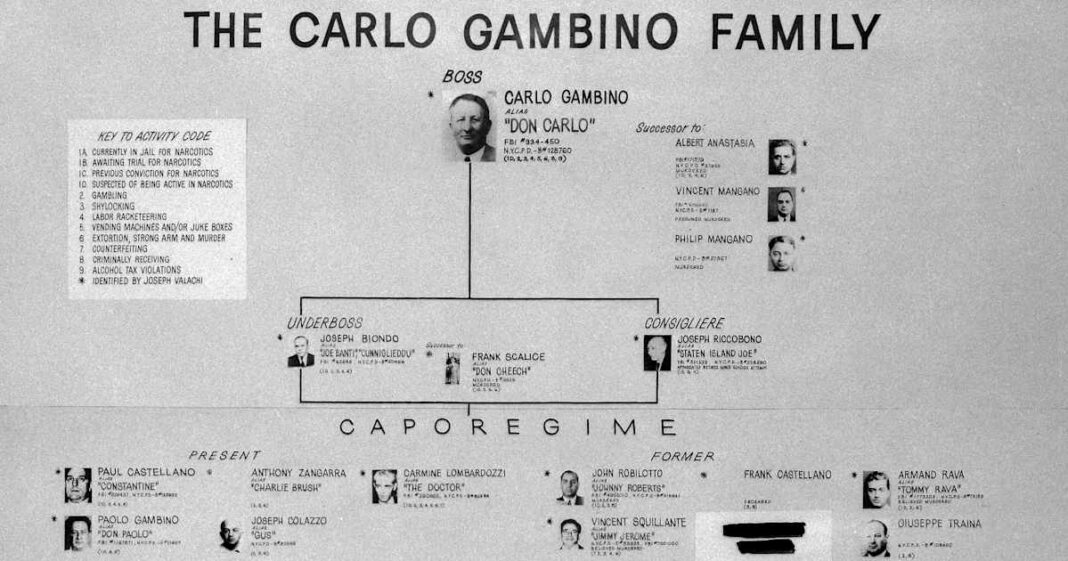The Rise of Organized Crime and the Legacy of the RICO Act
By the 1960s, organized crime had transitioned from the shadows to the limelight, capturing the public’s imagination and concern. This era marked a critical point in the United States, highlighting the complex interplay between crime, culture, and law enforcement.
The Era of Public Awareness
In 1963, Joseph Valachi, a low-ranking member of New York’s Genovese crime family, made headlines by testifying before Congress. This unprecedented move revealed the inner workings of La Cosa Nostra, commonly known as the Mafia. Valachi’s testimony not only provided a rare glimpse into the secretive world of organized crime but also ignited a national conversation about its influence and reach.
As the public began to grasp the scale of organized crime, Mario Puzo’s 1969 novel The Godfather further fueled this fascination. The book painted a romanticized picture of mob life, portraying violence and power as glamorous traits. Its subsequent film adaptation captivated audiences, firmly embedding the Mafia in American pop culture. This narrative, while fictional, played a role in shaping perceptions of organized crime, often blurring the lines between reality and myth.
The Legislative Response: Enter the RICO Act
To combat the growing threat of organized crime, lawmakers sought more robust legal tools. The result was the RICO Act, established in 1970, primarily through the efforts of attorney G. Robert Blakey. RICO—an acronym for the Racketeer Influenced and Corrupt Organizations Act—was meticulously crafted to address the Mafia’s infiltration of legitimate businesses and industries.
RICO’s design allowed law enforcement to target not just the individual criminals, but the entire enterprise involved in ongoing criminal activity. This marked a profound shift in legal strategy; rather than focusing exclusively on traditional crimes, RICO empowered authorities to dismantle organized crime from its core.
High-Profile Cases and RICO’s Effectiveness
Since its enactment, the RICO Act has been pivotal in several high-profile organized crime cases. One notable instance occurred in 1992 when the leaders of the Gambino crime family were prosecuted. This case underscored RICO’s ability to unwrap the complex layers of organized crime, enabling prosecutors to connect various individuals and activities under one overarching conspiracy.
More recently, in 2022, RICO was employed against the co-founder of the YSL music label and rapper Young Thug. This case illustrated the act’s ongoing relevance and adaptability in tackling modern organized crime, including emerging threats in the entertainment industry. The use of RICO in such contexts highlights how the goals of organized crime have evolved, necessitating updated legal frameworks for prosecution.
Cultural Reflections and Ongoing Challenges
The relationship between organized crime and American culture remains complex. Films, television shows, and books continue to romanticize the lifestyle, presenting antiheroes with compelling, albeit violent, narratives. This portrayal raises questions about the impact of media on public perception and law enforcement legitimacy. Despite RICO and other legal efforts, organized crime adapts, often staying one step ahead of the law.
The ongoing challenge of addressing organized crime reflects broader societal issues, including corruption, economic disparity, and community vulnerability. The effectiveness of laws like RICO hinges not only on enforcement but also on a collective understanding of the underlying social factors that allow such organizations to thrive.
Conclusion: A Legacy of Resistance
The saga of organized crime in the United States, punctuated by pivotal moments like Valachi’s testimony and the enactment of RICO, illustrates a continuous battle between law enforcement and organized criminal enterprises. As the narrative unfolds, it becomes clear that the fight against organized crime is not merely a legal endeavor but a societal one, rooted in the values and principles that a community chooses to uphold.



